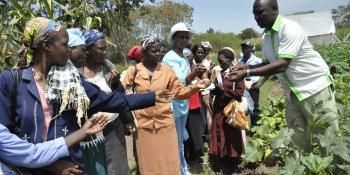Where women decide: faster adaptation, more resilience

In Kenya, farming households adapt better to climate change impacts where women make day-to-day decisions, study finds.
In Kenya’s Nyando district, farmer Hellen Chore is testing crop and livestock innovations on her half hectare farm. With the help of International Livestock Research Institute (ILRI) researchers, she now keeps better adapted breeds of livestock to meet the food security and income needs of her household. Hellen keeps Red Maasai sheep, reared for meat and preferred due to their fast growth rate, resistance to internal parasites, tolerance to trypanosomes, drought and heat stress.
Additionally, Hellen has constructed a 12,000 litre water harvesting pan and terraces to control soil and water movement on her farm. On a section of her impressive farm, through guidance from ILRI and International Potato Centre (CIP) scientists, she is conducting trials on sweet potato vines as livestock feed. Farmer Hellen, a widow, is among 100 champion farmers testing climate adaptation and mitigation innovations in Nyando. Farmers in this area continue to experience greater variability in the expected onset of seasonal rainfall with long dry spell days observed at early onset and extreme flooding during late onset events. This has resulted in 81% of families experiencing up to two hunger months in a year. Up to one third of these families are female headed.
In a paper presentation at the Our Common Future under Climate Change (CFCC15) science conference held from July 7-11 2015, CGIAR Research Program on Climate Change, Agriculture and Food Security (CCAFS) Gender and Policy Specialist Mary Nyasimi presented findings from a study conducted in east Africa on how men and women adjust their livelihoods and coping strategies at individual, household and village level in response to climate risks. She reports that the most rapid uptake of climate-resilient farming was among women, such as Hellen, whose husbands were not available and therefore not making day-to-day decisions.
Read more of these findings reported by Laurie Goering on the Thomson Reuters Foundation website: From second jobs to new 'stinginess', women see climate change differently.
View poster below: Engendering climate smart agricultural
Innovations in East Africa
Vivian Atakos is a Communications Specialist with CCAFS East Africa, based at the International Livestock Research Institute (ILRI) headquarters in Nairobi.
Original story was written by Laurie Goering and published on the Thomson Reuters Foundation website.



